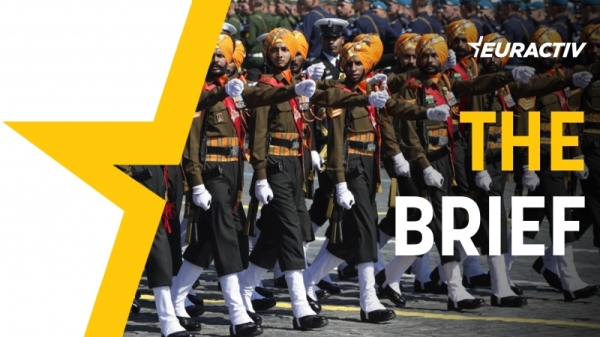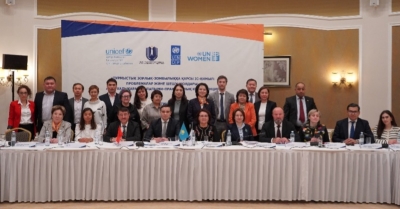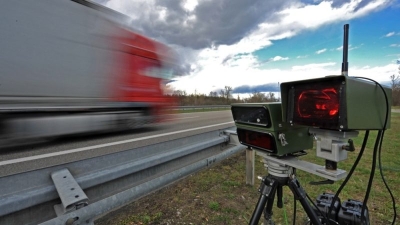The Brief — Putin’s friends are getting cold feet

Despite Russia’s brutal and unprovoked aggression against Ukraine, until recently, Moscow managed to secure the support – but mostly the abstention – of important international players when key United Nations votes were held. A UN vote last Monday, however, painted a different picture.
A year after the beginning of Russia’s aggression, the United Nations General Assembly adopted a resolution marking the war’s anniversary and demanding Moscow pull out and stop fighting.
There were 141 votes in favour and 32 abstentions. Six countries joined Russia in voting ‘No’ – Belarus, North Korea, Eritrea, Mali, Nicaragua and Syria.
BRICS members China, India, and South Africa abstained, this being an organisation Russia sees as its anti-Western allies, as did former Soviet republics Armenia, Kazakhstan, Uzbekistan, Kyrgyzstan, and Tajikistan, plus 24 other countries from Africa, Asia, and Latin America.
Now, fast forward to this week and spot the differences.
The UN resolution passed on 1 May contains a sentence mentioning “the aggression by the Russian Federation against Ukraine and against Georgia prior to that”.
Although the resolution’s title did not mention Russia or Ukraine, diplomats are generally very good at scrutinising the small print, no matter what the title says.
The vote result shows that, unsurprisingly, Belarus, North Korea, Nicaragua, and Syria again joined Russia in voting against it.
But the number of abstentions was 16, down from 32 in February, and remarkably, BRICS members China, India, and former Soviet republics Armenia and Kazakhstan are not among them.
Among other countries that abstained in February but voted in favour on 1 May, thus implicitly accepting the qualification of “aggression by the Russian Federation” against Ukraine and Georgia, are Algeria, Bangladesh, El Salvador, Laos, Mongolia, Pakistan, Sri Lanka, and Vietnam.
The 1 May resolution was on the cooperation between the United Nations and the Council of Europe (CoE), an international human rights watchdog from which Russia is now excluded.
The vote is, therefore even more meaningful, given that countries outside the European continent could have found an easy excuse to abstain or not to vote. Armenia is a member of CoE, unlike Kazakhstan, although a part of its territory is considered European.
To add insult to injury, a senior South African official said on Monday that Russian President Vladimir Putin could be arrested if he decides to attend the BRICS summit Pretoria will be hosting in August.
South African authorities explained they would have no choice but to execute the war crimes warrant issued by the International Criminal Court (ICC) for Putin’s arrest should he physically participate in the summit.
The Sunday Times reported that south African President Cyril Ramaphosa has even set up a special commission headed by his vice president to study the warrant.
The panel has reportedly found that South Africa, one of the 123 countries to have ratified the Rome Statute establishing the ICC, would be obligated to place Putin under arrest if he set foot in the country.
The option of South Africa leaving the Rome Statute was reportedly also looked into and rejected, as the procedure would take at least a year, during which time Pretoria would still be obliged to abide by the ICC rules.
The blunt explanations from Pretoria are a slap in Putin’s face. From Soviet times, Moscow has built strong ties with the African National Congress (ANC) of South Africa, the liberation force that fought apartheid, and it had for many years capitalised on these relations.
Relations flourished under the controversial former president Jakob Zuma.
But this is when South Africa hosted, in 2015, an African Union summit attended by the Sudanese President Omar al-Bashir, a fugitive from the International Criminal Court. The international criticism and Zuma’s inadequate reactions are now prompting Ramaphosa to be extra careful.
Last year the 9 May parade on the Moscow Red Square was held without inviting foreign leaders and elite foreign troops as was previously the case. Ambassadors, mostly from mainly Middle Eastern and African countries, watched the parade, many of them wearing national outfits, as the state agency TASS described.
This year the parade is expected to be even more low-key. It is not even certain that Putin will physically appear – he now has a perfect pretext to take cover following a drone incident on the night of 3 May, described by the Kremlin as a Ukrainian attempt to kill him.
And in many Russian regions, the parade is cancelled – be it because the local leaders see it fraught with risks or simply because they now lack the military and equipment as much was sent to Ukraine.
Until now, it was considered that Russia had been more successful on the diplomatic front than the battlefield, but for the first time since the start of the aggression, Russia appears equally bad on both fronts.
The Roundup
The European Union and the US will strive to align on green tech, emerging technologies, and export control measures in a high-level meeting due later this month.
The European Union is said to be full of untapped hydroelectric deposits that could be useful for making the energy system more flexible, but NGOs warn of the potentially devastating environmental effects of re-harnessing natural hydropower.
The European Commission has released its initiative to combat the piracy of live events, sticking with a non-binding format that has frustrated both Parliamentarians and rightsholders.
European Commission Vice-President Margrethe Vestager has been criticised by the European hydrogen lobby group, Hydrogen Europe, following her remarks on the future role of hydrogen, in a letter seen by EURACTIV.
As always, don’t miss our weekly EU Politics Decoded and the Economy Brief: Alternatives to debt, and the exclusive video: Ukraine refugee crisis, one year on.
Look out for….
- Commissioner Nicolas Schmit visits Swedish Public Employment Service in Stockholm.
- Informal meeting of health ministers continues on Friday.
- Economy Commissioner Paolo Gentiloni participates in “State of the Union 2023” conference, organised by European University Institute, in Florence.
- Commissioner Thierry Breton delivers keynote speech at opening of European Tourism Day 2023 in Brussels.



